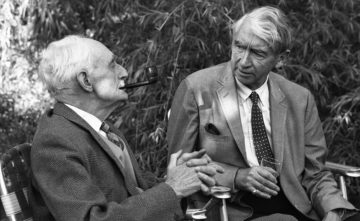Nicholas Burman in Jacobin:

In a natural society there will be no precious or privileged beings called artists,” Herbert Read declares in his 1941 essay To Hell With Culture. “There will only be workers.” The eightieth anniversary of this essay’s publication provides an excuse to return to Read and consider him and the relevancy of his work today.
Read is often described as a contradictory figure: a bow-tied, softly spoken pacifist; an art critic open to automated processes but nostalgic for the medieval crafts guilds; a philosopher who stressed the importance of workers owning the means of production but who was far from an orthodox Marxist.
While being an early adopter of Nietzsche made him a Europeanizer of British criticism, he also stuck closely to the traditional objects of art history while continental counterparts expanded their analyses to include cities and social movements. Generally friendly toward him, George Orwell wrote that Read’s “open-mindedness has been his strength and weakness.”
More here.
